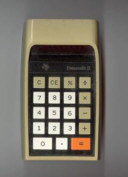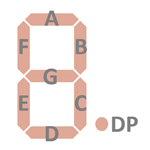
DATAMATH CALCULATOR MUSEUM
 |
DATAMATH CALCULATOR MUSEUM |
Characterization of Sharp Single-chip Calculator Circuits - LI2000 Product Family
The DCM-50A Platform supports the Characterization of many Non-TI single-chip calculator circuits with up to 42-pin packages using the DCM-50A Playground DIL42 Adapter mounted on top of the DCM-50A PG Frame Carrier with the voltages VSS and VDD/VGG set to the appropriate levels.
| • Package Markings Top: LI2002 4G 058 • Package Markings Bottom: • Donor Calculator: Lloyd's Accumatic 30 (Model EH-9036, Type 255), August 1974 |
Keyboard: The Lloyd's Accumatic 30 makes use of a keyboard assembly with 19 spring-supported plastic keys pushing small fingers on three stamped sheet-metal plates against contacts etched on a single-sided phenolic PCB. All switches but the [C] key are arranged in a 9*2 matrix with the rows connected to the D1-D9 Outputs (Display Scan) and the columns connected to the KN and KF Inputs (Keyboard Scan) of the LI2002 single-chip calculator circuit. The [C] key is connected directly between VGG and the /ATC Input of the LI2002.
Keyboard Matrix of the Lloyd's Accumatic 30 (Model EH-9036, Type 255):
LI2002 | |||
| KN | KF | /ATC | |
| VGG | C | ||
| D1 | 2 | % | |
| D2 | 3 | = | |
| D3 | 4 | + | |
| D4 | 5 | − | |
| D5 | 6 | × | |
| D6 | 7 | ÷ | |
| D7 | 8 | . | |
| D8 | 9 | 0 | |
| D9 | 1 | CE | |
![]() Display: The
Lloyd's Accumatic 30 makes use of an 8-digit Futaba 8-CT-01A
low-voltage Vacuum Fluorescent Display (VFD) connected directly to the
respective 8 Digit Outputs D2 to D9 and 8 Segment Outputs SA to SG and SDP of
the LI2002 and biased to approximately -32 Volts. An additional discrete red LED
is used as minus sign for negative numbers and connected between a transistor
activated with Digit Output D1 and Segment Output G.
Display: The
Lloyd's Accumatic 30 makes use of an 8-digit Futaba 8-CT-01A
low-voltage Vacuum Fluorescent Display (VFD) connected directly to the
respective 8 Digit Outputs D2 to D9 and 8 Segment Outputs SA to SG and SDP of
the LI2002 and biased to approximately -32 Volts. An additional discrete red LED
is used as minus sign for negative numbers and connected between a transistor
activated with Digit Output D1 and Segment Output G.
Display Layout:
| Futaba 8-CT-01A plus LED |
|
|
| The Segment drivers A-G and DP (Decimal Point) are connected to the Futaba 8-CT-01A display in the pictured way. |  |
Display Fonts:
| Type | Calculator | Number Fonts | Decimal Separator |
Thousands Separator |
Entry Overflow |
Calculating Overflow |
Minus |
| LI2002 | Lloyd's Accumatic 30 |
n.a. |
|
Error Condition: The LI2002 signals error conditions like accumulator overflow/underflow or division by zero
with an "8-Digit friendly" zero with all decimal points lit '. . . . . . .0. .'
instead the more common 'C' or 'E'.
Scanning: Display and keyboard scanning is performed in D1 → D9 direction at a rate of
about 2,200 Hz:
|
• State Time = 1 Clock =
0.0125 ms @ CK1, CK2=80 kHz • Digit Time = 4 States = 0.05 ms @ CK1, CK2=80 kHz • Scan Time = 9 Digit Times = 0.45 ms @ CK=80 kHz |
If you have additions to the above article please email: joerg@datamath.org.
© Joerg Woerner, October 11, 2024. No reprints without written permission.